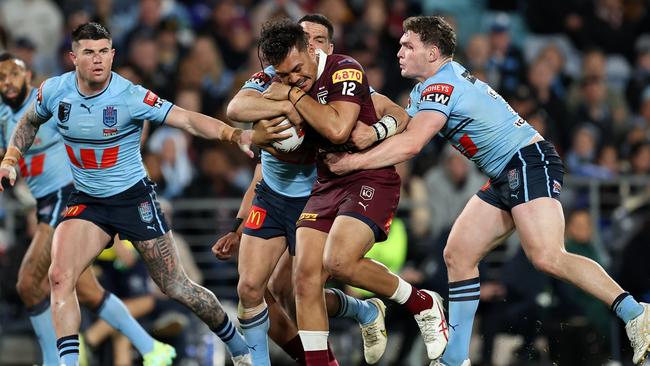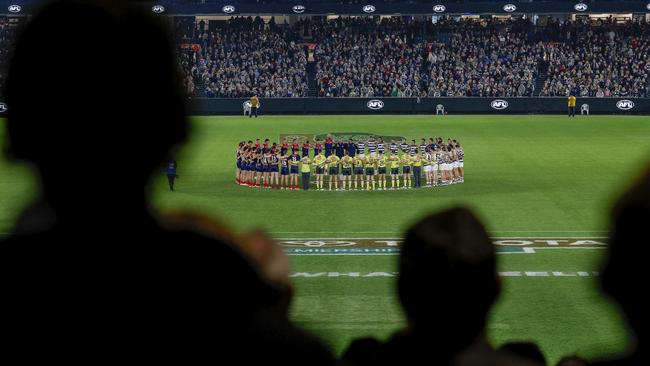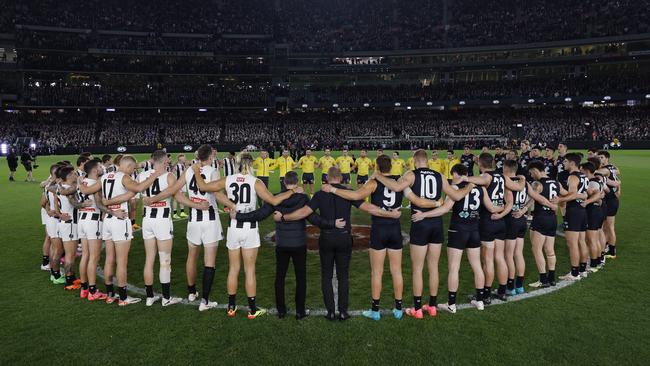‘Horrifying reality’ of State of Origin night for domestic violence victims
For thousands of Aussies, tonight’s State of Origin game will be cause for celebration. But, at its core sits a “horrifying reality”.
Lifestyle
Don't miss out on the headlines from Lifestyle. Followed categories will be added to My News.
For thousands of Australians, the first game of this year’s State of Origin series is a catalyst for exhilaration, mateship and unbridled joy. In its shadow, however, sits a sombre reality.
For countless women and children, tonight’s match between the Maroons and the Blues at Sydney’s Accor Stadium is cause not for celebration and camaraderie, but hypervigilance and fear.
First responders will be preparing. Helpline employees will be waiting for the phone to ring, with calls surging in the not just hours, but days that follow.
The correlation between certain major sporting events and gendered violence is well-documented. A 2018 study by the NSW Bureau of Crime Statistics and Research (BOSCAR) found domestic assault rates increased by 40.7 per cent in the 12-hour window between 6pm and 6am on State of Origin nights. In Victoria, it’s a similar tale: data has shown both the AFL Grand Final and Melbourne Cup bring spikes in acts of intimate partner abuse.
“This is a horrifying reality for far too many Australian women and children,” Monash University’s Dr Kate Fitz-Gibbon told news.com.au.
As communities across the nation grieve the alleged murders of yet another four women, advocates have once again expressed their concern ahead of tonight’s game.
They’ve also questioned how much of a role sport plays in enabling what Anthony Albanese has repeatedly labelled our “national crisis” – and what responsibility the codes have in calling it out.

‘It is specifically men’s violence that increases’
Sport is not the sole cause of domestic and family violence. But the culture of excessive drinking and gambling, and normalisation of on-field aggression that surrounds these major events is part of the problem we desperately need to fix.
Research published by La Trobe University in 2022 found the frequency and severity of violence went hand-in-hand with drunkenness and the loss of income from gambling.
While none of these factors should lead to – or are an excuse for – men’s violence against women, they can “increase the likelihood or severity” of it, Our Watch CEO, Patty Kinnersly, told news.com.au.
“When we look closely, we see that it is specifically men’s violence that increases during big sporting events. So, we know it’s not just the alcohol alone that is driving higher levels of violence,” Ms Kinnersly said.
The drivers of men’s violence against women – including the need for men to have power and control over women, rigid gender stereotypes, and disrespect for women – can be “magnified and worsened by harmful levels of alcohol use”, she explained.
“Because alcohol can weaken men’s empathy, care, concern and respect for those around them, particularly women,” Ms Kinnersly said.
“To stop men from using violence, we must address not only the amplifying factors like alcohol and gambling, but the culture that allows men’s violence against women to thrive.”
On #StateofOrigin night NSW women & children are 40% more likely to experience DV. Alcohol & gambling fuel this. Govt needs to tighten regulations on these industries & demand better prevention strategies from sporting codes like NRL #QT#auspolhttps://t.co/OJyXC1zEavpic.twitter.com/gmRkBnou8I
— 🌠Zali Steggall MP (@zalisteggall) May 30, 2024
Last week, the Prime Minister acknowledged the link between alcohol and domestic violence when prompted by independent Warringah MP Zali Steggall, who raised the 2018 BOSCAR State of Origin statistics during Question Time.
“Alcohol and gambling are known drivers of domestic violence and government violence prevention frameworks in Australia have been reluctant to tackle multibillion-dollar alcohol and gambling industries,” Ms Steggall told Mr Albanese.
She then asked him: “When will your government take greater steps to regulate these harmful industries to keep Australian women safe in this national crisis and encourage greater prevention strategies and sporting codes like the NRL?”
In response, Mr Albanese said he “accept(ed) completely the startling statistics that the member raised with me earlier today about a spike (in domestic violence) that will occur when a major sporting event like the State of Origin game is held”.
Yet funding for the frontline services who will no doubt be inundated as a result of that spike is critically lacking.
“Domestic and family violence support services across Australia have been crying out for increased funding following a horrific first half of the year,” Dr Fitz-Gibbon said.
“A spike in reporting and help-seeking requires additional resources to ensure that calls do not go unanswered, (and) to ensure that we have the specialist practitioners needed to identify risk and undertake safety planning with victim-survivors.”

‘Sporting bodies are in a powerful position’
Given the “clear link” between certain sporting events and domestic violence, Chair of La Trobe University’s Violence Against Women Research Network, Dr Kirsty Forsdike, told news.com.au, “as well as the fact that sport is embedded in our culture and seen as a key site for the prevention of violence against women, of course (the leagues) have a responsibility” to take a stand.
“I would like to know how much money the NRL, AFL and other large sporting leagues have invested in prevention and frontline support services for the partners and families of fans,” Teach Us Consent founder, Chanel Contos, wrote in a May piece for The Saturday Paper.
“Why is it okay one of the most dangerous nights in Australia to be a woman or a child is the night of a sporting grand final?
“We have double demerit points for driving offences on long weekends and public holidays because of a known correlation between accidents from drink driving and celebration. What double reinforced penalties or safety measures are implemented on nights when men congregate en masse?”
Sporting bodies and players, Ms Kinnersly said, “are in a powerful position to challenge the attitudes and behaviours that lead to violence against women and to set the standard for acceptable behaviour across our community”.
At the elite level, most codes are trying to educate those within their sports – the NRL’s Voice Against Violence program, led by Our Watch, is the same organisation the AFL has recently partnered with.

The NRL also implements the “Change the Story” framework in partnership with ANROWS and VicHealth, which includes a zero tolerance education program for juniors transitioning into seniors. And in 2019, the league introduced a discretionary “no fault, stand down” rule for players charged with serious criminal offences, and/or offences involving women and children. Under this rule, players must stand from matches until the matter is resolved.
Recent “tokenistic gestures” – like the minute’s silence observed during the AFL’s Round 8 matches to honour the victim’s of gender-based violence – “do not go far enough”, Dr Forsdike said.
“Much more needs to be done by sporting codes, particularly in response to players who have been convicted of domestic violence themselves,” she added.
“Such responses should occur from the elite level through to grassroots in the community where women are experiencing violence at the hands of men.”
Dr Fitz-Gibbon agreed. While activations like the AFL’s moment’s silence are “important”, they “should extend to more than one commitment on any one given game night”.
“Addressing the national crisis of violence against women is everyone’s responsibility,” she said, “and sporting codes and clubs have a really critical role to play.”
State of Origin partners with DrinkWise campaign
DrinkWise on Monday announced it had teamed up with the NSW Government, NSW Police Force, the NRL, 1800RESPECT, Men’s Referral Service and 13YARN for its annual Always Respect, Always Drinkwise campaign.
“The NSW Government is pleased to be partnering with DrinkWise on the Always respect, always DrinkWise message to continue educating NRL fans about drinking responsibly and reinforcing expectations about behaviour,” Minister for Women, Jodie Harrison, said.
“It’s important to take a collaborative approach to health and safety and this initiative demonstrates how the government, NSW Police and the community can work together to create a healthier, safer drinking culture.”
Originally published as ‘Horrifying reality’ of State of Origin night for domestic violence victims





